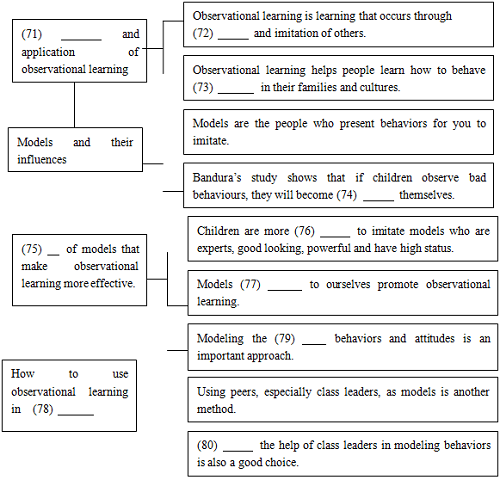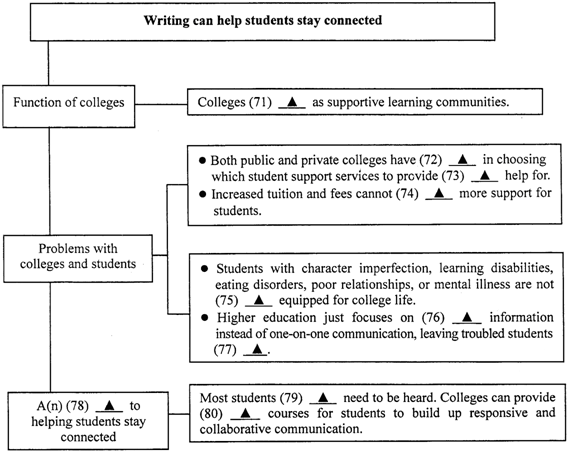题目内容
19.Observational Learning:To See Is to KnowA group of psychologists,led by Albert Bandura,developed social learning theory,which emphasizes the fact that much learning occurs in a social context.This kind of learning,which results simply from observing and imitating the behaviors of others,is called observational learning.Observational learning helps people acquire proper behaviors in their families and cultures:By watching others,we learn how to greet people,eat,laugh and tell jokes.Do you still remember your first few days in senior grade one?By watching others,you learned how people talked to each other,what clothes were"fashionable,"and how to interact with instructors.
The people from whom you learn new behaviors through observing function as models,presenting a behavior to be imitated.With modeling,you observe others'behaviors,and then none,some,or all of these behaviors may be learned and repeated,or modified.In one of Bandura's classic studies,children were divided into three groups:One group watched an adult beating up a Bobo doll,one group watched an adult ignoring the Bobo doll,and the third didn't see an adult at all.After being mildly frustrated by being placed in a room with toys,but not being allowed to play with some of them,all of the children were then placed in another room with a variety of toys,including a Bobo doll.Children in the first group tended to imitate what they had seen,mistreating the doll (and inventing new ways to abuse it) and being aggressive with the other toys in the room.
Researchers have discovered that several characteristics of models can make learning through observation more effective.Not surprisingly,the more you pay attention to the model,the more you learn.You are more likely to pay attention if the model is an expert,is good looking,has high status,or is socially powerful.Second,by watching others,we learn about what behaviors are appropriate for people like ourselves,so models who are seen as similar are more readily imitated.All students need to see successful,capable models who look and sound like them.
Then,as teachers,how can you apply observational learning?Here are a few guidelines.Above all,model the behaviors and attitudes you desire your students to learn.For example,show enthusiasm for the subject you teach.Be willing to demonstrate both the mental and the physical tasks you expect the students to perform.Second,use peers,especially class leaders,as models.For example,in group work,pair students who do well with those who are having difficulties.Third,you may seek the help of class leaders in modeling behaviors.Examples include letting high-status students lead an activity when you need class cooperation or when students are likely to be reluctant at first.
Observational Learning:To See Is to Know

分析 文章介绍什么是观察学习,观察学习的应用,怎么将观察学习用于教学中.
解答 71.Definition/Concept/Meaning
归纳题:根据右边的内容:Observational learning is learning that occurs through (2)and imitation of others.可知这是观察学习的定义,Definition/Concept/Meaning
72.observation
词性转化题:根据第一段的句子:This kind of learning,which results simply from observing and imitating the behaviors of others,is called observational learning.可知将observing 改成observation.
73.properly/appropriately/well
词性转化题:根据第一段的句子:Observational learning helps people acquire proper behaviors in their families and cultures:可知将proper改成 properly/appropriately/well.
74.aggressive/violent/rude
原词重现题:根据第二段的句子:Children in the first group tended to imitate what they had seen,mistreating the doll (and inventing new ways to abuse it) and being aggressive with the other toys in the room.可知看见不好的行为的孩子自己也会有攻击性,aggressive/violent/rude.
75.Features/Characteristics
原词重现题:根据第三段的句子:Researchers have discovered that several characteristics of models can make learning through observation more effective.可知这里介绍观察学习榜样的特点:Features/Characteristics.
76.likely
原词重现题:根据第三段的句子:You are more likely to pay attention if the model is an expert,is good looking,has high status,or is socially powerful.可知填likely
77.similar
句意理解题:根据第三段的句子:Second,by watching others,we learn about what behaviors are appropriate for people like ourselves,可知和我们相像的人会促进观察学习.like="similar"to
78.teaching/education/instruction
词性转化题:根据第四段的句子:Then,as teachers,how can you apply observational learning?可知怎么将观察学习应用于教学中:teaching/education/instruction.
79.desired/expected/target
词性转化题:根据第四段的句子:Above all,model the behaviors and attitudes you desire your students to learn.可知将desire改成desired/expected/targeted.
80.Seeking
词性转化题:根据第四段的句子:Third,you may seek the help of class leaders in modeling behaviors.可知将seek改成Seeking.
点评 任务型阅读首先是一篇阅读理解.为了确保对文章准确深刻理解,同时提高解题速度,最终能顺利完成该项任务,考生必须做到:
1.注重平时词汇记忆,熟练掌握考纲词汇中常用词汇的词性转化.
2.了解文章的结构,把握全篇的文,即句与句、段与段之间的逻辑关系.
3.加强限时阅读训练,尤其是词数在400~550之间的较长篇幅的阅读训练.
4.系统训练,循序渐进,最终达到相应的解题能力要求.

| A. | However | B. | Whenever | C. | Wherever | D. | Whatever |
I can honestly say that I didn't get in(12)Awith my parents when I was young,because all my mom would do is to(13)Cher voice to me and I would cry.
My mother washed my blanket until it became so worn that she finally said,"Marcy,it has to (14)D.It is old and looks really dirty.Mommy will make you a new one."I was sad,but I knew that my Mommy would keep her (15)Bto me--she always did.But it wasn't until I got much older that my mother (16)Bthe blanket she had promised me,because she was a very hard worker and didn't have much (17)C to do things she planned to.
Although the new blanket was nice,I always (18)Amy little old blanket-it gave me a sense of (19)B.Oh!How I remember the safe feeling that I would get when I held it (20)Dto me!
| 11.A.wherever | B.whenever | C.however | D.whatever |
| 12.A.trouble | B.turn | C.touch | D.anger |
| 13.A.bring | B.give | C.raise | D.lower |
| 14.A.bargain | B.bear | C.fade | D.go |
| 15.A.blanket | B.promise | C.fame | D.duty |
| 16.A.bought | B.wove | C.1ent | D.mended |
| 17.A.money | B.patience | C.time | D.chance |
| 18.A.missed | B.decorated | C.concerned | D.recommended |
| 19.A.warmth | B.security | C.freedom | D.power |
| 20.A.quietly | B.hard | C.freely | D.close |
As the assistant professor of the Honors Programs at the university,one of my(24)Dwas to review student transcripts (学生成绩报告单) to make sure they(25)Arequirements for continuing in Honors.It was (26)Dfor freshmen (大一新生) to have a rough start and be (27)Bthat they could no longer continue in Honors after their first term.Sometimes their second term report cards would fee sent to us,even though students were no longer in the program.
The note she handed me(28)A,"Congratulations on your excellent second term.You may have been(29)Bat your fall grades,but you should feel(30)Dof how you've turned your effort around.Best of luck in (31)A the good work,and you'll be qualified for graduation with excellent grades."
I didn't remember sending the note,written at the bottom of her second term transcript.
The student went on and said,"You can't know what this (32)Bto me.I've carried it in my wallet for three years and took it out (33)CI didn't want to do my work.For three years I've been(34)Cto enter your office and give you this note and this transcript."She handed me her(35)Atranscript with good marks.
We were both excited.She cried and I(36)Bto.Writing the note seemed like nothing to me,(37)D it made a great difference to her.I really had no (38)Cmy actions had such meaning.
I've enjoyed this memory for many years-with (39)A for such an act of kindness.The kindness of course wasn't mine in writing the note,but her kindness in wanting me to know what I did had (40)D.I really thank her!
| 21.A.pulled down | B.pulled off | C.pulled out | D.pulled up |
| 22.A.bag | B.pocket | C.wallet | D.box |
| 23.A.remembered | B.forgot | C.regretted | D.minded |
| 24.A.aims | B.wishes | C.pleasures | D.jobs |
| 25.A.met | B.dissatisfied | C.set | D.relaxed |
| 26.A.hard | B.unusual | C.popular | D.common |
| 27.A.blamed | B.told | C.reminded | D.refused |
| 28.A.read | B.showed | C.indicated | D.announced |
| 29.A.surprised | B.disappointed | C.embarrassed | D.delighted |
| 30.A.sick | B.afraid | C.tired | D.proud |
| 31.A.keeping up | B.holding up | C.depending on | D.trying on |
| 32.A.brought | B.meant | C.influenced | D.happened |
| 33.A.however | B.wherever | C.whenever | D.whatever |
| 34.A.hesitating | B.advising | C.planning | D.promising |
| 35.A.latest | B.lost | C.first | D.dirty |
| 36.A.failed | B.wanted | C.decided | D.hated |
| 37.A.so | B.or | C.and | D.but |
| 38.A.doubt | B.wonder | C.idea | D.problem |
| 39.A.appreciation | B.excitement | C.respect | D.pride |
| 40.A.succeeded | B.changed | C.improved | D.mattered. |
| A. | which | B. | what | C. | one | D. | it |
| A. | has been caused | B. | had been caused | ||
| C. | will be caused | D. | will have been caused |
